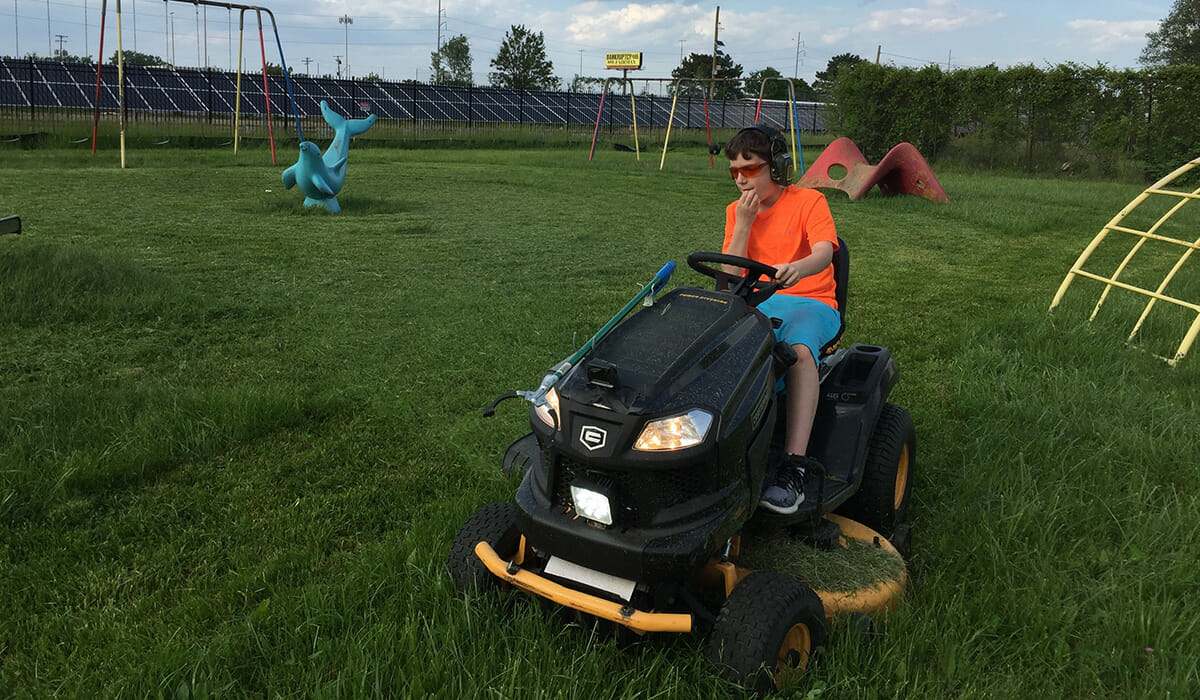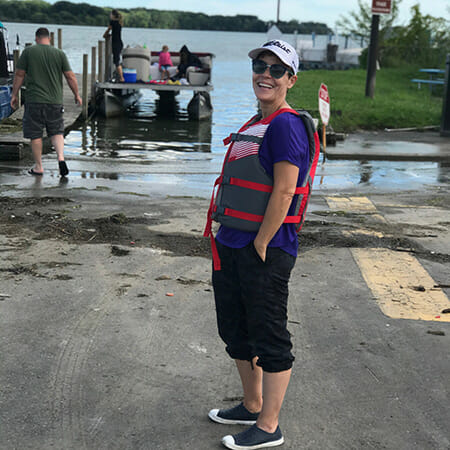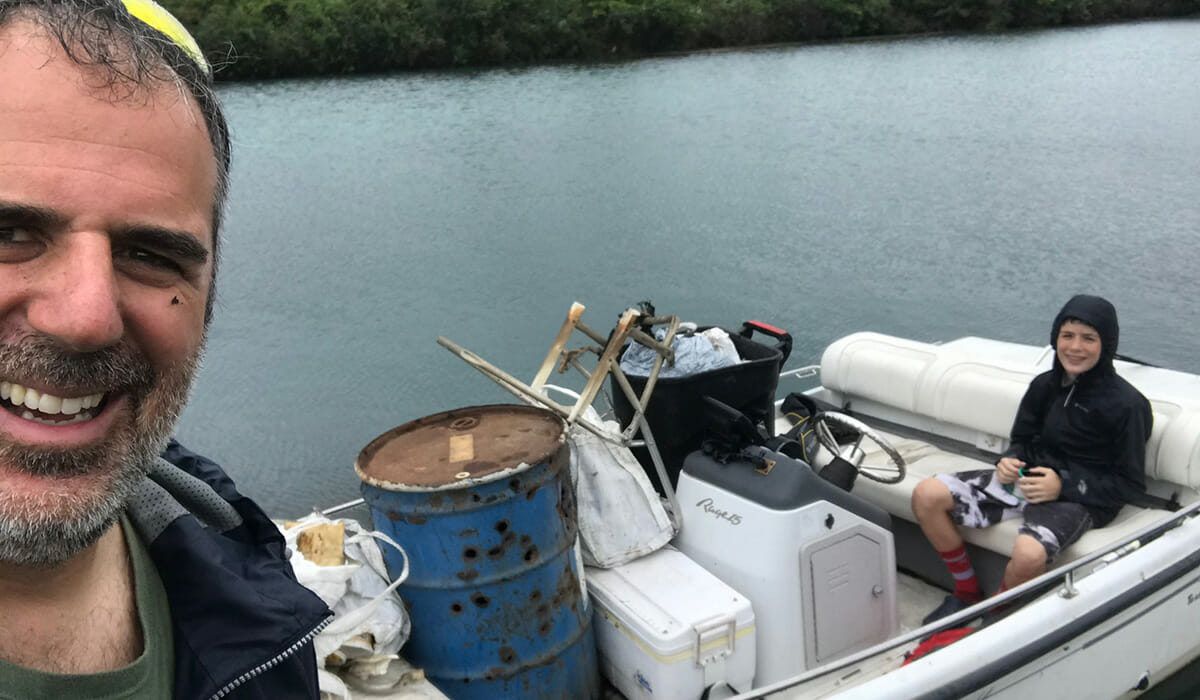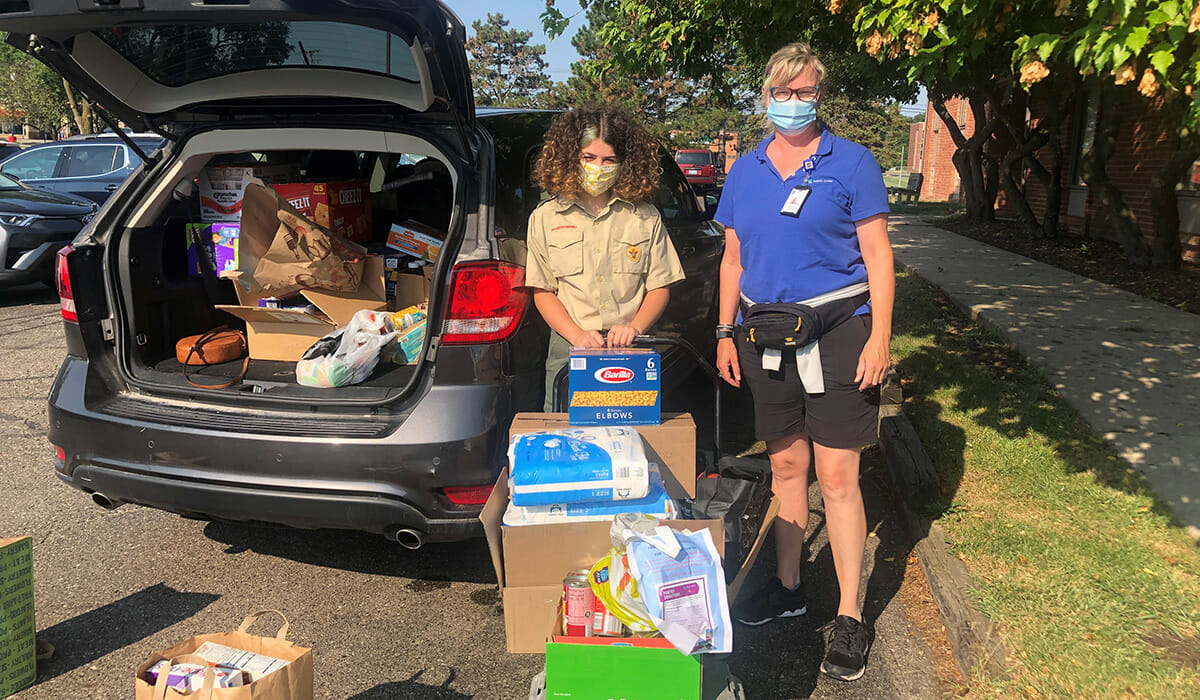Family of Volunteers Bring Fun and Games to Cleaning Up Detroit

Meet Daily Point of Light Award honorees Tom, Lisa, Michael, Margot, and Mark Nardone. Read their story and nominate an outstanding volunteer or family as a Point of Light.
The Nardone family philosophy comes down to “something is better than nothing” — as in, any helpful act, no matter how small, is better than the alternative of having not helped out at all. The Birmingham, Mich.-based family — including dad Tom, mom Lisa, and kids Michael, Margot, and Mark — use this mantra to make their volunteer work as fun as possible, all while helping to clean up their community.
A little over ten years ago, Tom started the Mower Gang — a group of volunteer landscapers who mow and clean up abandoned parks and playgrounds in Detroit. Mark, who enjoyed helping the Gang out but felt there wasn’t much for him to do without a mower of his own, was then inspired to create trash fishing. While trash fishing, the family and a group of fellow volunteers go out on the Detroit River in search of garbage to collect and dispose of. The family decided last year to combine the two activities and form the nonprofit Enemies of Debris. The Nardone kids carried on the volunteer spirit by all using their Eagle Scout projects to benefit their community.
Through all their volunteering, the Nardones bring fun to the act of cleaning up. The Mower Gang incorporates contests and games into their lawn mowing, culminating in the Motown Modown, a 12-hour volunteer event to crown a Grand Champion mower, complete with a championship belt as a prize. Contests also abound in trash fishing, with the winner of the most contests each year receiving the title of Trash Fishing World Champion. The Nardones even bring the spirit of trash fishing with them while on vacation, having collected trash in Rome, Houston, and St. Augustine, Fl.

Can you describe what the Mower Gang is and what your inspiration was to start it?
Tom: The Mower Gang is a group of volunteer landscapers who clean up and mow abandoned parks and playgrounds in the city of Detroit. The city of Detroit was going to declare bankruptcy and they had just announced they couldn’t afford to take care of some of the parks anymore. I thought that sounded like a pretty easy thing to do on a summer’s evening, so I started mowing a park myself, and then I quickly realized it would be more fun if there were other people involved. I formed a gang — not a group, it’s a gang, because we’re cool — and instead of motorcycles, we use lawn tractors.
Can you tell me about trash fishing?
Mark: Trash fishing is me, my dad, my sister, and whoever wants to come in the family. We have a little Boston Whaler, and we go out on the Detroit River and we just pick up whatever trash we can find. … We have a contest every couple weeks and there’s three categories — the most unusual trash, the biggest piece of trash, and the most trash. We normally have ten people, with only like four boats.
Tom: It’s kind of like a fast fishing contest, but we have a trash fishing contest. Everyone goes out on their boats and tries to outdo each other. A lot of the people are from the Mower Gang. These guys are like super volunteers. We go out on these Huck Finn adventures looking for trash.
Lisa: It’s a fun thing to do as a family. We’ve even done it while we were on vacation. We did it in Rome, Italy. We did it in Florida. It sounds like a chore but it is actually really fun. We also feel like we did something to make the world a little bit better when we’re done. It’s very fulfilling.
Can you describe your Eagle Scout Projects?
Michael: I had other people in my Boy Scouts group walk the [Palmer Park] and use the app MapMyRun. Then I took the data from their app and I used it to create a trail map of the park. The park has gone almost 150 years without a map, so they were very grateful to get one.
Margot: For my Eagle project, I did a food drive for the Judson Center. Because of COVID, I couldn’t conduct a normal food drive because there was a lot of contact with people, so I decided to do a food drive where we dropped bags off at people’s houses. I had the Scouts and my troop drop bags at their friends’ and families’ houses. They would fill them up with food and leave them at their doorstep so we could then pick them up and bring them over to our house. Then we drove all of the food to the Judson Center and we dropped it off there. The Judson Center helps foster families and it helps kids in need. … It’s important to me because they needed a lot of help, especially because of COVID. They didn’t have a lot of support throughout the pandemic. When we brought it in, they were super happy because they had a food pantry and it was pretty much completely empty. It made me really happy when we filled up their entire food pantry and then the lady immediately started calling families to come get food because they finally had it.
Mark: Me and my dad go fishing also, not just trash fishing, and there’s all this fishing line — this clear stuff that’s very hard to see and it doesn’t decompose. It’s meant to be very tough. I’m building these fishing line deposits [monofilament recycling bins]. You put your fishing line in it and it’s properly disposed of, because it’s really dangerous to fish. … Fish have a tough time seeing it, and they’ll get wrapped up in it and die, so I feel like it’s important to reduce leaving that in the waterways as much as possible.

Can you tell me about Enemies of Debris?
Tom: After the Mower Gang and trash fishing stuff, we finally formed a nonprofit called Enemies of Debris. Now that we’re a nonprofit we can do other things, so this year we started something called the Great American Pick Up Pick Up. It challenges people who drive pickup trucks to one day a year go pick up trash off the city streets. We did it for the first time this year. We got the city of Detroit to allow us to dump the trash for free, and we picked up over 7,000 pounds of trash in one day. That was fun.
What has it meant for you all to be able to volunteer together as a family?
Tom: What’s really important to me as a dad was when I first started doing this, one of the volunteers said “when you do nice things, you meet really nice people,” so then I get to introduce my kids to all sorts of really nice people. That’s who shows up to volunteer. Think about what type of person is going to take their lawn tractor that’s worth thousands of dollars, drag it down to Detroit somehow, and mow a park, right? They’re ambitious, they’re outgoing, they’re kind hearted, hard working. That’s who I want my kids to meet and to see. And I want those people to meet and see my kids, because someday they might need help with a job or some project or something, and these are people they can turn to. Michael, when he wanted to do the mapping of the park, the Mower Gang turned out for that. There were fallen trees blocking the trail, and they brought chainsaws out and cut them up and moved them out of the way, and all sorts of stuff like that.
What’s been the most rewarding part of your work?
Lisa: For me, it’s seeing that my kids are taking it and extending it into their lives. All their Eagle projects are really centered around things they feel passionate about, wanting to help others, so I see the seeds growing in them and them wanting to be service oriented.
Margot: I like when you directly help people and you can see how happy they are after you do it. Or like trash fishing, when you clean out a place and then you go back and you see how clean it stayed, and how you really did make a difference. It’s really satisfying.
Michael: I like when you mow parks, kids will always come out right away to come play.
Mark: I like the feeling, after we trash fish, of looking at how much trash we picked up.
Tom: I like all the friends I’ve made along the way. Most of them are people I never would have met otherwise, and they’re just the greatest people.

What have you learned through your experiences as a volunteer?
Lisa: I learned that what Tom said is very true — that when you do good things, you’ll meet good people. They’re all the types of people you want to surround yourself with, because they’re really in it with you and they’re cheering for you.
Tom: I learned you can make these things fun. You get a better response by making it fun than you would any other way. Not everybody needs financial awards or anything like that. In fact, most people who do volunteer work don’t. They’re not there for that. But if you make it fun, they’ll come back.
What do you want people to learn from your story?
Lisa: My husband has a saying that I think is very powerful, and it’s something is better than nothing. The idea is that just by doing something, you’re making an impact. You may not think it’s big, you may not think it has widespread impact — but when you do something, it’s certainly better than doing nothing at all. That’s how we view trash fishing and the Mower Gang and everything else. We’re out there doing something, and that’s enough.
Do you want to make a difference in your community like Nardone family? Find local volunteer opportunities.
